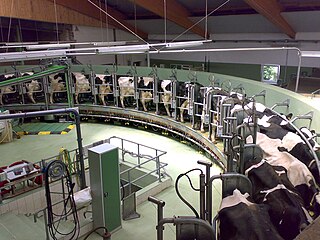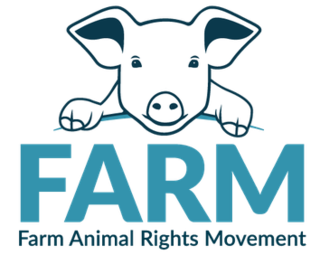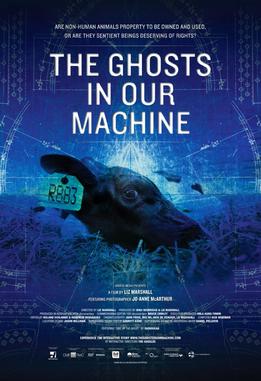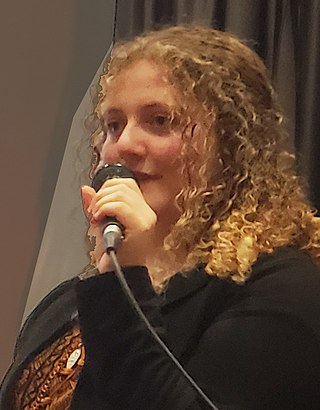Related Research Articles

Animal husbandry is the branch of agriculture concerned with animals that are raised for meat, fibre, milk, or other products. It includes day-to-day care, management, production, nutrition, selective breeding, and the raising of livestock. Husbandry has a long history, starting with the Neolithic Revolution when animals were first domesticated, from around 13,000 BC onwards, predating farming of the first crops. During the period of ancient societies like ancient Egypt, cattle, sheep, goats, and pigs were being raised on farms.

A downer is an animal, usually livestock, that cannot stand on its own and therefore is to be killed. A downed animal, one that is unable to stand, is not necessarily a downer.

Dairy farming is a class of agriculture for the long-term production of milk, which is processed for the eventual sale of a dairy product. Dairy farming has a history that goes back to the early Neolithic era, around the seventh millennium BC, in many regions of Europe and Africa. Before the 20th century, milking was done by hand on small farms. Beginning in the early 20th century, milking was done in large scale dairy farms with innovations including rotary parlors, the milking pipeline, and automatic milking systems that were commercially developed in the early 1990s.

The meat-packing industry handles the slaughtering, processing, packaging, and distribution of meat from animals such as cattle, pigs, sheep and other livestock. Poultry is generally not included. This greater part of the entire meat industry is primarily focused on producing meat for human consumption, but it also yields a variety of by-products including hides, dried blood, protein meals such as meat & bone meal, and, through the process of rendering, fats.

The Union Stock Yard & Transit Co., or The Yards, was the meatpacking district in Chicago for more than a century, starting in 1865. The district was operated by a group of railroad companies that acquired marshland and turned it into a centralized processing area. By the 1890s, the railroad capital behind the Union Stockyards was Vanderbilt money. The Union Stockyards operated in the New City community area for 106 years, helping Chicago become known as the "hog butcher for the world", the center of the American meatpacking industry for decades. The yards became inspiration for literature and social reform.

Farm Sanctuary is an American animal protection organization, founded in 1986 as an advocate for farmed animals. It was America's first shelter for farmed animals. It promotes laws and policies that support animal welfare, animal protection, and veganism through rescue, education, and advocacy. Farm Sanctuary houses over 800 cows, chickens, ducks, geese, turkeys, pigs, sheep, and goats at a 300+ acre animal sanctuary in Watkins Glen, New York, and more than 100 animals at its location in Acton, California, near Los Angeles.

The Packers and Stockyards Act of 1921 regulates meatpacking, livestock dealers, market agencies, live poultry dealers, and swine contractors to prohibit unfair or deceptive practices, giving undue preferences, apportioning supply, manipulating prices, or creating a monopoly. It was enacted following the release in 1919 of the Report of the Federal Trade Commission on the meatpacking industry.

Hillside Animal Sanctuary, based in Frettenham, Norwich, and with a site at West Runton, North Norfolk, is the United Kingdom's largest home for different kinds of farm animals and horses. The vegan-run sanctuary is funded entirely on public donations. The sanctuary was established by Wendy Valentine and its patron is actor Martin Shaw.

Gene Baur, formerly known as Gene Bauston, is an American author and activist in the animal rights and food movement. He’s been called the "conscience of the food movement" by Time magazine, and opposes factory farming and advocates for what he believes would be a more just and respectful food system. Baur is president and co-founder of Farm Sanctuary, a farm animal protection organization. He is vegan and has been involved with animal rights since he co-founded Farm Sanctuary in 1986. Baur has authored two books and various articles.
National City was a suburb of East St. Louis, Illinois. Incorporated in 1907, it was a company town for the St. Louis National Stockyards Company. In 1996, the company, which owned all residential property in the town, evicted all of its residents. The following year, because it had no residents, National City was dissolved by court order. Its site was subsequently annexed by nearby Fairmont City, Illinois.
Mercy For Animals (MFA) is an international nonprofit animal protection organization founded in 1999 by Milo Runkle. MFA's mission is to "prevent cruelty to farmed animals and promote compassionate food choices and policies."

Michael Herschel Greger is an American physician, author, and speaker on public health issues best known for his advocacy of a whole-food, plant-based diet, and his opposition to animal-derived food products.
Ag-gag laws are anti-whistleblower laws that apply within the agriculture industry. Popularized by Mark Bittman in an April 2011 The New York Times column, the term ag-gag typically refers to state laws in the United States of America that forbid undercover filming or photography of activity on farms without the consent of their owner—particularly targeting whistleblowers of animal rights abuses at these facilities. Although these laws originated in the United States, they have also begun to appear elsewhere, such as in Australia and Canada.

Farm Animal Rights Movement (FARM) is an international nonprofit organization working to promote a vegan lifestyle and animal rights through public education and grass roots outreach. It operates ten national and international programs from its headquarters in Bethesda, Maryland. FARM has the abolitionist vision of a world where animals are free from all forms of human exploitation, including, food and clothing, research and testing, entertainment and hunting. FARM's mission is to spare the largest number of animals from being bred, abused, and slaughtered for food, as this accounts for 98% of all animal abuse and slaughter.

Direct Action Everywhere (DxE) is an international grassroots network of animal rights activists founded in 2013 in the San Francisco Bay Area. DxE uses disruptive protests and non-violent direct action tactics, such as open rescue of animals from factory farms. Their intent is to build a movement that can eventually shift culture and change social and political institutions. DxE activists work to "put an end to the commodity status of animals."

The Ghosts in Our Machine is a 2013 Canadian documentary film by Liz Marshall. The film follows the photojournalist and animal rights activist Jo-Anne McArthur as she photographs animals on fur farms and at Farm Sanctuary, among other places, and seeks to publish her work. The film as a whole is a plea for animal rights.
In 2014 Germany received a B out of possible grades A, B, C, D, E, F, G on World Animal Protection's Animal Protection Index. This was lowered to a C grade in their 2020 Animal Protection Index.

Zoe Rosenberg is an American animal rights activist and animal sanctuary founder. She participates in public forms of direct action at sporting and university events. In 2014, Rosenberg founded the Happy Hen Animal Sanctuary based in San Luis Obispo, California.
RSPCA Assured is a not-for-profit farm animal welfare assurance and food labelling scheme from the RSPCA. All farms on the RSPCA Assured scheme must comply with the RSPCA's "stringent higher welfare standards". RSPCA Assured assesses farms, hauliers and abattoirs and if they meet every standard, the RSPCA Assured label can be used on their food product. RSPCA Assured was founded in 1994 as Freedom Food, with the standards of welfare based on the five freedoms that were defined by the UK Government's Farm Animal Welfare Committee. In 2015, Freedom Food was rebranded as RSPCA Assured and claims that all animals under its scheme are raised to "higher farm animal welfare standards". In 2017, it was estimated that since its creation the RSPCA Assured scheme has raised 600 million animals under its welfare standards. Animal welfare historians have noted that the RSPCA Assured scheme has influenced other humane food certification programs operating worldwide.
References
- Associated Press. "Champion of downed livestock", 13 May 1991.
- Baur, Gene. Farm Sanctuary. Simon and Schuster, 2008.
- Finsen, Lawrence and Finsen, Susan. The Animal Rights Movement in America. Twayne Publishers, 1994.
- Reed, Susan. "Where's the Beef? Don't Ask", People magazine, 19 August 1991, Vol. 36, No. 6.
- Rosenberg, Howard. "A Prize for a Video Muckraker Television: Becky Sandstedt's videocam helps stop cruelty inside the South St. Paul, Minn., stockyard", Los Angeles Times, 23 October 1991.
- Wolfson, David J. (1996). "Beyond the Law: Agribusiness and the Systemic Abuse of Animals Raised for Food or Food Production". Animal Law Review . 2 (1): 123–154. S2CID 235181535 .